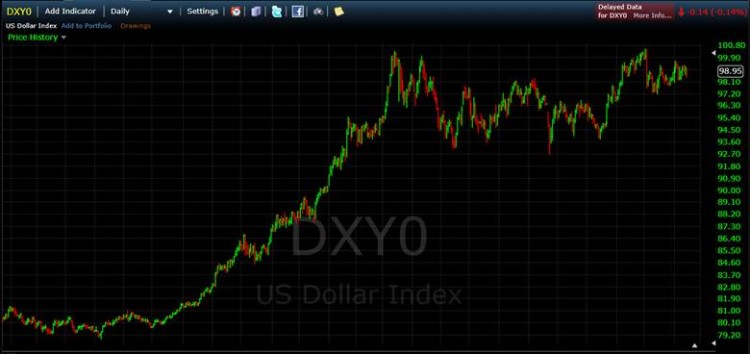I have the best clients. Most of them are retired after successful careers. They understand investing and are able to differentiate between real market data versus salesman hype. They are intelligent. They are tuned into what is going on around the world and do a good job of understanding the vagaries of the financial markets. The more we interact the better we both become. I highly value their thoughts and concerns about the markets and investing.
Could Saudi Actions Cause A US Dollar Crash?
I received an email from one such client yesterday. He is an international traveler that spends several months each year in emerging markets. He is a great source for what he sees ‘on the ground’. His question was about the potential impact if Saudi Arabia decoupled (removing their currency peg) from the US Dollar.
Here is his question:
Jeff,
What about the rumors about Saudi Arabia will de-peg from the US dollar? The financial world sees this as a very serious move against the US dollar. They are calling this the Great Currency Shock of 2016. Saudi felt that the US has stabbed them in the back because of releasing the hold of billions of dollars to Iran who is an enemy of Saudi Arabia. People are predicting that this will send major shocks waves through the market. Do you have any thoughts on this rumor?
There has been concern over the US Dollar for many years. Critics will talk about how the massive debt we have will cause a US Dollar crash. They say that China can crash our currency and/or that the Chinese Yuan will become the new reserve currency (remember the IMF is now including it in the Special Drawing Right or basket of currencies it uses).
And, of course, financial newsletter writers have been scaring people into buying their subscriptions by promoting the same “the US Dollar crash is coming and you’ll lose all your money unless you do THIS.” Careful here.
Here’s my take on it:
The Saudi’s decided a few years ago that fracking was a threat to their oil-cartel dominance and that they needed to deal with the threat posed by American oil. So they decided to continue to pump as much oil as they could even in the midst of a glut of oil. Their goal was (and is) to run the ‘frackers’ out of business. They knew that strategy would produce pain for their economy in the short run but that it should allow them to maintain their dominance long term.
So Saudi Arabia has been running massive deficits as a result. And the fact that their currency peg is to the US Dollar keeps them from de-valuing their currency relative to the USD. Whereas China can devalue their currency relative to the USD and make Chinese goods and services less expensive, Saudi Arabia can’t because of the USD currency peg.
Remember, a stronger US Dollar imports DEFLATION into the United States. That means that same thing happens to other countries that are pegged to the US Dollar. So as the US Dollar goes up, it has the impact of importing deflation for Saudi Arabia. That’s good for their consumer but bad for their businesses and their oil revenues. This chart shows how the USD has strengthened by almost 20% since early 2014. That’s a lot of pain for countries with currencies pegged to the US Dollar and/or those emerging market economies that have over $9 Trillion in US Dollar-denominated debt.
So the real reason that Saudi may want to de-peg from the US Dollar isn’t because they are concerned about the US Dollar losing its reserve currency status, it is because they need to be able to de-value their currency to try to spur their economy along. In other words, a Saudi currency de-peg is a sign of weakness in their economy. It is a sign of desperation and highlights the cost of trying to run the ‘frackers’ out of business.
So I’m not concerned about it from a reserve currency basis or a US Dollar crash, per say. I am concerned about the strength of the USD for our economy, though, because it makes our businesses less competitive on the world stage. A strong US Dollar acts like applying the brakes to our economy, the same way that the Federal Reserve raises interest rates in an attempt to slow the economy. When you combine a 20 percent increase in the US Dollar Index the last two years and the recent Federal Reserve rate hike amidst a cyclically slowing economy, it looks like we may be heading for a recession. With the worst start of the year EVER for the stock market, the markets seem to share that fear.
Twitter: @JeffVoudrie
The author holds positions U.S. Treasuries securities at the time of publication. Any opinions expressed herein are solely those of the author, and do not in any way represent the views or opinions of any other person or entity.









